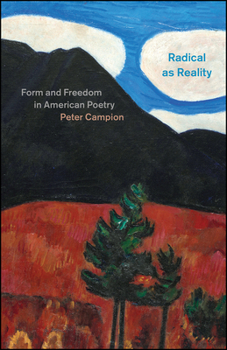Radical as Reality: Form and Freedom in American Poetry
Select Format
Select Condition 
Book Overview
What do American poets mean when they talk about freedom? How can form help us understand questions about what shapes we want to give our poetic lives, and how much power we have to choose those shapes? For that matter, what do we even mean by we? In this collection of essays, Peter Campion gathers his thoughts on these questions and more to form an evolutionary history of the past century of American poetry. Through close readings of the great modernists, midcentury objectivists, late twentieth-century poets, his contemporaries, and more, Campion unearths an American poetic landscape that is subtler and more varied than most critics have allowed. He discovers commonalities among poets considered opposites, dramatizes how form and history are mutually entailing, and explores how the conventions of poetry, its inheritance, and its inventions sprang from the tensions of ordinary life. At its core, this is a book about poetic making, one that reveals how the best poets not only receive but understand and adapt what comes before them, reinterpreting the history of their art to create work that is, indeed, radical as reality.
Format:Paperback
Language:English
ISBN:022666337X
ISBN13:9780226663371
Release Date:October 2019
Publisher:University of Chicago Press
Length:256 Pages
Weight:2.95 lbs.
Dimensions:0.3" x 5.4" x 8.6"
Customer Reviews
0 rating





